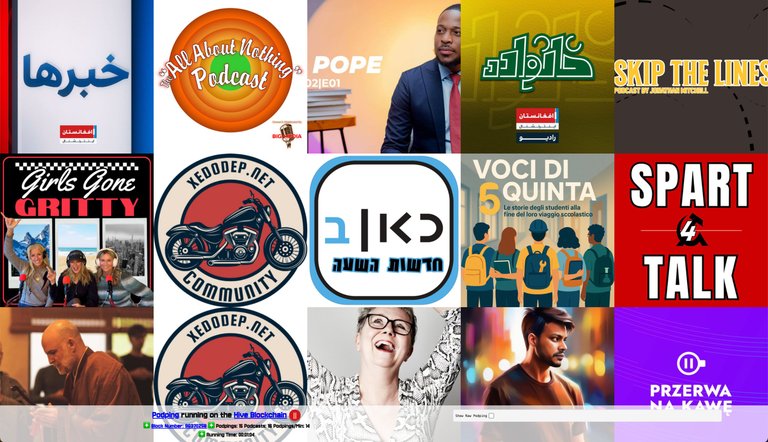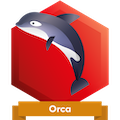Podping on Hive is quietly announcing 3,000 podcast episodes per hour
Support Proposal 303 on PeakD
Vote for Brianoflondon's Witness KeyChain or HiveSigner
This is a value for value post: see the explanation in the footer.
APPLE IS BROKEN! Where's my Podcast?
Just this week one of the biggest Podcasters in the world got very frustrated with Apple over her podcast not showing up in Apple's Podcast App after more than 6 hours.
https://x.com/megynkelly/status/1927526271820431726
There appears to have been an outage at Apple but this once again brought up the real fix for these kinds of things which is for wider adoption of a system called Podping. That goes a long way to fix this problem and is in use by quite a big chunk of the podcast industry but not by Apple, Spotify or Google.
So I thought I'd re-explain Podping again.

Polling RSS
Every hour, between 1,500 and 4,000 new podcast episodes are published across the web on RSS feeds, a distributed, resilient technology that has survived despite competition from tech giants like Facebook and Google. RSS, often described as an "internet dinosaur," continues to chug along reliably, serving as the backbone of podcasting.
The Problem with Distributed RSS Feeds
In today's instant-notification world, distributed RSS feeds have a critical flaw: you can't know when a feed has been updated without checking it. This requires:
- A directory of podcast RSS feeds, which may include millions of feeds, many inactive for years.
- A way to detect changes, especially for dormant podcasts (e.g., Serial) that suddenly release a new episode after years of silence.
The Polling Solution
The traditional solution is polling: repeatedly querying the RSS feed host to check for updates, much like a child asking, "Are we there yet?" on a road trip. In the early days of the internet, polling was handled by client devices (computers, iPods, MP3 players, and later phones), which checked the feeds their users subscribed to.
Over time, this shifted to centralized services like Apple, Google, and Spotify, which now maintain podcast directories and handle polling for millions of feeds. For example, your iPhone queries Apple to check for podcast updates, and Apple tracks over 4 million feeds.
Limitations of Centralized Polling
Despite efforts like WebSub (a push-based notification system), polling remains dominant. WebSub, largely run by Google, requires complex subscribing and re-subscribing processes and lacks long-term reliability due to its dependence on a single company. There's no guarantee it will persist, especially without clear monetization.
What's needed is a global, decentralized notification system that:
- Sends signals anyone can see.
- Is resistant to censorship.
- Runs on infrastructure not controlled by a single entity that could defund or shut it down.
Podcasting 2.0: A Decentralized Solution
The Podcasting 2.0 initiative by the Podcast Index recognized this challenge but saw it as a complex problem. How do you build a global, decentralized, low-latency notification system without relying on expensive, centralized servers?
Enter Blockchain
In 2011, I first learned about Bitcoin on the podcast Security Now! with Steve Gibson. I experimented with it, securing a modest 0.02 BTC from a faucet, but didn't pursue it further at the time (though I kept the keys!). By 2018, after my Facebook account and a 1.2 million-follower group I co-managed were shut down by order of the British Government, a friend introduced me to Steem, a blockchain-based social media platform.
I was skeptical—how could a social media system run on a blockchain? But it worked. I secured my account, now at https://hive.blog/@brianoflondon, with my own cryptographic keys, which no one can delete. When a billionaire attempted to take over Steem, the community forked the chain, creating Hive, which continues to thrive.
How Hive Works
Unlike Bitcoin's proof of work, Hive uses a delegated proof of stake system. A rotating group of 20 main witnesses (plus over 100 backups) validates blocks every 3 seconds, storing vast amounts of text data at low cost. Witnesses are incentivized with Hive tokens, which have a market value. Running a witness costs about $50/month for a server, with top witnesses earning $2,000–$3,000/month and lower-ranked ones covering costs at $300/month.
This creates a healthy economic incentive to keep the system running.
Blockchain as a "Terrible" Database
Hive functions as a slow but powerful database with unique properties:
- Global read access: Anyone can view the data.
- Authenticated write access: Valid key pairs allow secure posting.
- Censorship resistance: The chain can't be altered without rewriting the core software.
- Financial incentives: Witnesses are rewarded to maintain the system.
- Zero transaction fees: No direct costs for posting data.
Hive is absolutely unique in allowing all of this.
Podping on Hive: Revolutionizing Podcast Notifications
Podping leverages Hive to solve the RSS polling problem. When a new podcast episode is published, the hosting company (or an intermediary like podping.cloud) sends a JSON blob to the Hive blockchain. For example:
GET https://podping.cloud/?url=https://feeds.example.org/podcast/rss
Within seconds, the notification is recorded on Hive. Any client watching the blockchain (using a few lines of JavaScript, Python, or other languages) can detect it, check the feed if relevant, or ignore it. The permanent record allows clients to catch up after downtime by scanning back minutes, hours, or even months.
Resource Credits
Posting to Hive uses Resource Credits, which are earned by staking Hive tokens. Credits regenerate every 3 days, and holding about $5,000 USD in Hive covers the entire Podping system's usage without spending the tokens.
Live Notifications
Podping enables something new for podcasting: live stream notifications. Unlike siloed platforms (e.g., YouTube won't alert you to a Facebook stream), Podping provides an open system any app can monitor. Many apps now combine traditional podcast playback with live stream alerts. See examples at New Podcast Apps.
This open, open-source, and censorship-resistant system aligns with the spirit of the early web, resisting domination by tech giants.
Monitoring Podping
You can watch Podping in action at https://tiles.podping.org, which displays podcast art as updates occur. For a live view of podcast updates and Hive accounts (many use podping.aaa, podping.bbb, etc., run by Dave Jones at Podcast Index), visit https://podping.org/Pingslurp_Accounts.
Is Podping a New Internet Protocol?
I asked Grok, and it said Podping is "almost" a protocol but falls short due to its reliance on Hive and focus on podcasting. Grok's take:
Podping is a groundbreaking system that elegantly solves the RSS polling problem for podcasting, offering a decentralized, censorship-resistant, and efficient notification mechanism. It exhibits many characteristics of a protocol—standardized data format, interoperability, scalability, and adoption—but its niche focus on podcasting, reliance on the Hive blockchain, and lack of formal standardization prevent it from fully qualifying as a new Internet Protocol in the traditional sense. Instead, it is better described as a specialized application-layer protocol or a de facto standard for podcasting notifications, with the potential to evolve into a broader protocol if it expands to other domains or gains formal recognition.
Postscript
Writing this (by hand, with no AI except the Grok quote) was therapeutic. I’m unsure if you’ll use it or find it interesting, but I’ll likely publish it on Hive. Long ago, I earned a PhD in theoretical physics and wrote a computational fluid dynamics simulation for polymeric liquids in the late '90s using C++ on a Silicon Graphics machine—the kind used to render Terminator 2 and Jurassic Park. As I said, "I know this, it’s a Unix system."
Value for Value
For the last few months while building @v4vapp I was generously supported by the DHF. Going forward I have a much more modest support which covers direct server costs and a little of my time.
If you appreciate the work I do on and around Hive, you can express this directly: upvoting posts on Hive is great. Also consider a direct donation (there's a Tip button on Hive or a Lightning Address) on all my posts.


Support Proposal 303 on PeakD
Support Proposal 303 with Hivesigner
Support Proposal 303 on Ecency
Vote for Brianoflondon's Witness KeyChain or HiveSigner

I still find Podping a very innovative concept. Hopefully the big Podcasting Platforms will recognize its potential one day.
6h delay is indeed a big gap. My experience is that Spotify takes 10-20min, Apple Podcast and Fountain even a bit longer to show newly Publishes Episodes.
Hive is someday going to reach that standard of maintenance which as we know the platform is growing in a positive state. great one for podping as it usage is also encouraging.
This is just the beginning for hive and I am so sure it is just a matter of time, we will see the Manifestation of hive high standard. I am so sure of that certainly
Congratulations @brianoflondon! You received a personal badge!
Participate in the next Power Up month to get another one!
You can view your badges on your board and compare yourself to others in the Ranking
Check out our last posts:
https://www.reddit.com/r/podcast/comments/1l0ssk2/apple_is_broken_wheres_my_podcast/
This post has been shared on Reddit through the HivePosh initiative.
Podping have so many qualities and interesting features that people who arent aware of it should get to know. The good part about podping which I find so unique is the aspect of it showcasing notifications through livestreams which is a good one and a work well done unlike other social media like facebook which doesn't display such.